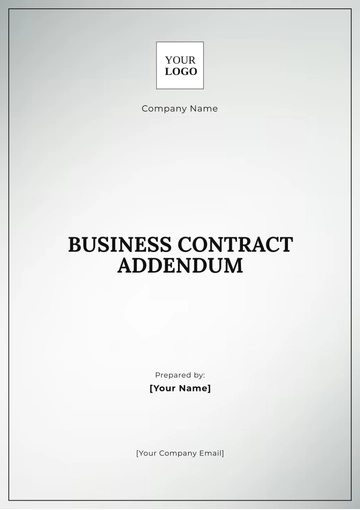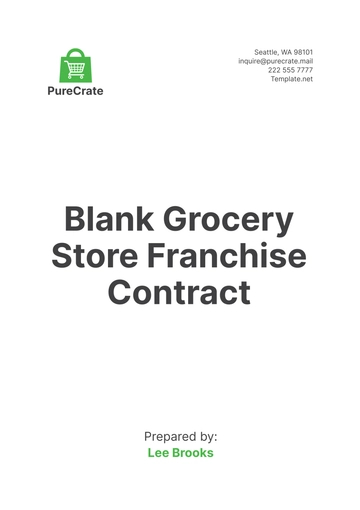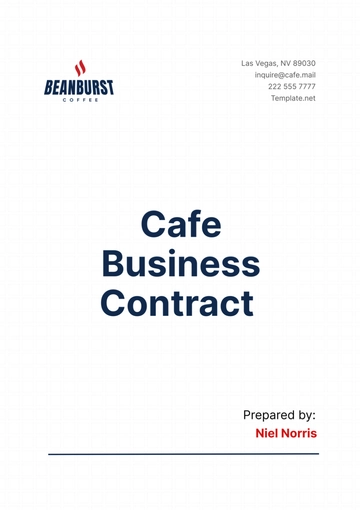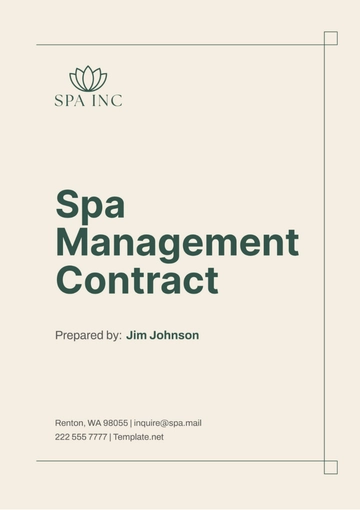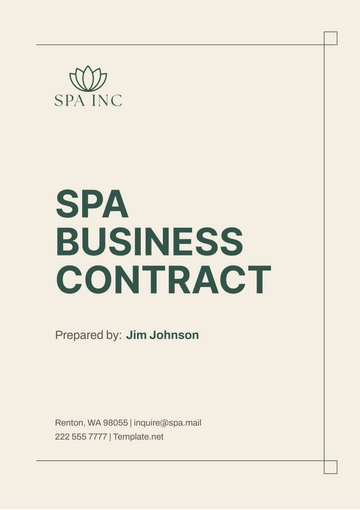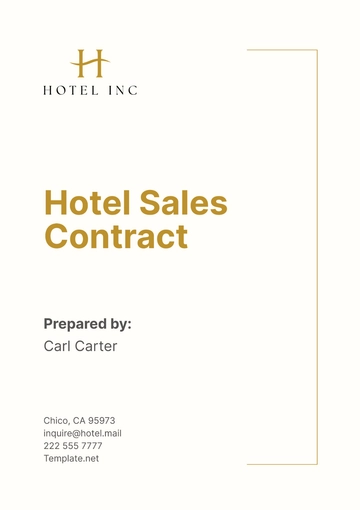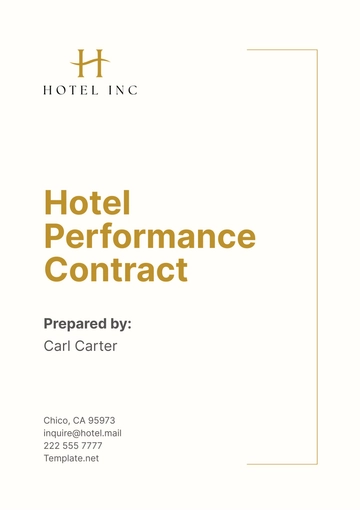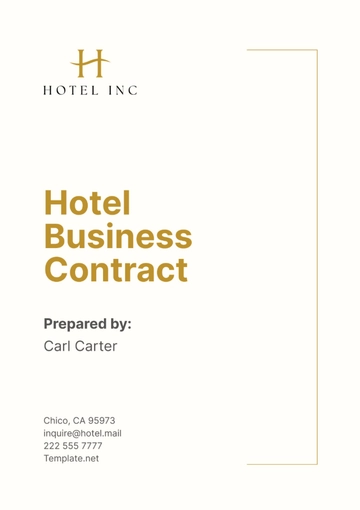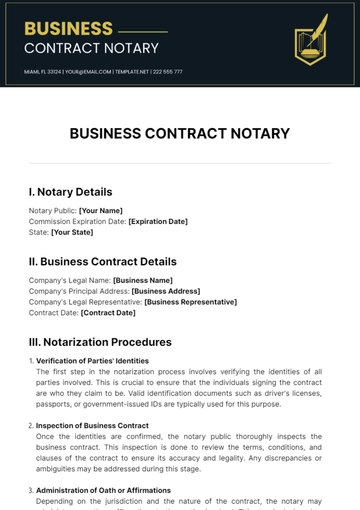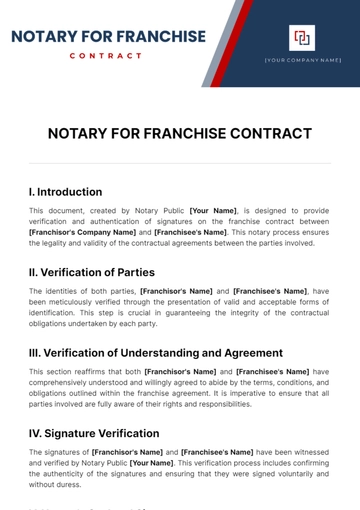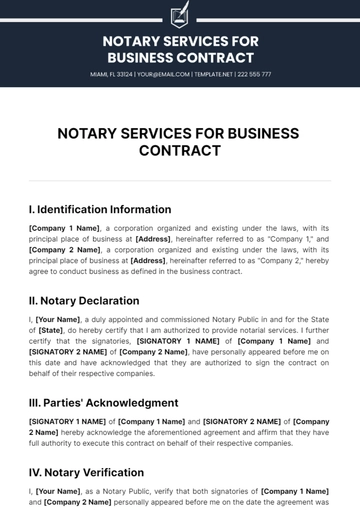Free Hotel Business Contract
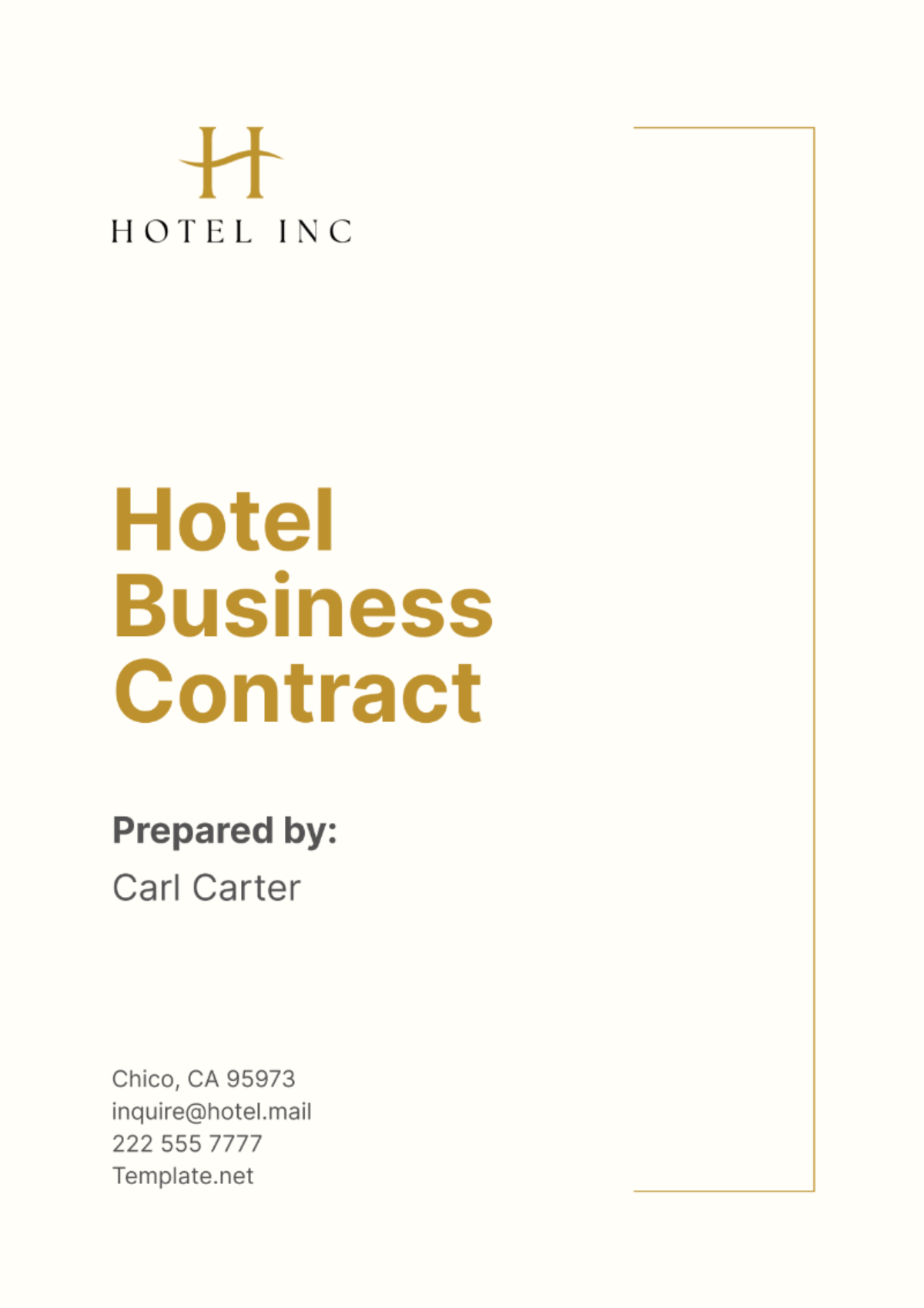
I. The Parties
This Business Contract ("Agreement") is made and entered into on [Month Day, Year] ("Effective Date") by and between [Your Company Name] ("Hotel") with a primary place of business at [Your Company Address] and [Client's Name] ("Client") with a place of business at [Client's Address] collectively referred to as the ("Parties").
WHEREAS, the Hotel is engaged in the business of providing hotel services and accommodations;
WHEREAS, the Client desires to engage with the Hotel for the purpose of utilizing its hotel services and accommodations;
WHEREAS, the Parties desire to enter into a formal business relationship and set forth the terms and conditions of their agreement in this Contract;
NOW THEREFORE, in consideration of the mutual covenants and promises herein contained, the Parties hereto agree as follows:
II. Services Provided
A. Hotel Services
The Hotel agrees to provide the Client with a comprehensive range of hotel services and accommodations. These services are designed to ensure a comfortable and enjoyable stay for the Client and their guests:
Room Accommodations: The Hotel will offer various room types, including standard rooms, suites, and deluxe rooms. Each room will be equipped with amenities such as comfortable beds, high-quality linens, and modern furnishings.
Meeting Spaces and Event Facilities: If required, the Hotel will provide meeting rooms, conference spaces, and event facilities. These spaces will be equipped with audiovisual equipment, comfortable seating, and customizable layouts to accommodate business meetings, seminars, or social events.
Catering and Dining Services: The Hotel’s culinary team will prepare delicious meals for the Client and their guests. Menus can be customized to cater to dietary preferences, and the Hotel’s restaurant will offer a variety of dining options.
Recreational Amenities: The Hotel boasts recreational facilities such as a fitness center, swimming pool, spa, and outdoor spaces. Guests can unwind, exercise, or enjoy leisure activities during their stay.
Concierge Assistance: The Hotel’s concierge services will assist the Client with travel arrangements, local recommendations, and any special requests. Whether it’s booking tickets for local attractions or arranging transportation, the concierge team is at the Client’s service.
B. Accommodations Details
Room Types and Amenities
1.1. Single Rooms: Cozy rooms suitable for solo travelers or couples.
1.2. Double Rooms: Spacious rooms with twin beds or a queen-sized bed.
1.3. Suites: Luxurious suites with separate living areas, kitchenettes, and additional amenities.
1.4. Amenities: All rooms will include amenities such as flat-screen TVs, minibars, Wi-Fi, and en-suite bathrooms with toiletries.
Housekeeping and Maintenance
2.1. The Hotel will maintain cleanliness and hygiene in all rooms.
2.2. Housekeeping services will be provided daily, ensuring fresh linens, tidy rooms, and replenished supplies.
III. Payment Terms
A. Total Amount
The total amount for the services shall be [$4,500]. This includes room charges, dining expenses, and the additional services requested by the Client.
B. Payment Due Date
The Client shall make the payment by [Month Day, Year]. Prompt payment ensures a seamless experience during the stay.
C. Accepted Payment Methods
Payments can be made via the following methods:
Credit Card: The Client may use a valid debit/credit card to settle the payment. The Hotel will securely process the transaction.
Bank Transfer: The Client can transfer the funds directly to the Hotel’s designated bank account. The Hotel will provide the necessary account details.
Other Agreed-Upon Methods: If the Client prefers an alternative payment method (e.g., cash, check), they should discuss it with the Hotel in advance.
IV. Term and Termination
A. Commencement and Duration
Effective Date: This Contract shall commence on the Effective Date specified in the agreement. The Effective Date marks the official start of the business relationship between the Hotel and the Client.
Duration: The Contract shall continue in effect until terminated by either party.
B. Termination by Notice
Notice Period: Either party may terminate this Contract by providing written notice to the other party. The notice period shall be [30] days. During this time, both parties can prepare for the termination.
Mutual Agreement: Termination by notice allows both parties to end the Contract amicably. It provides flexibility while ensuring proper communication.
C. Termination for Cause
Breach of Material Terms: Termination for cause may occur if either party breaches any material term of this Contract. Material terms include significant obligations or responsibilities outlined in the agreement.
Immediate Termination: If a party commits a serious breach (e.g., fraud, violation of confidentiality), the other party may terminate the Contract immediately without notice.
Legal Implications: Termination for cause may have legal implications. Both parties should seek legal advice if such a situation arises.
V. Confidentiality
A. Obligation to Maintain Confidentiality
Confidential Information: Each party agrees to maintain the confidentiality of the other party’s proprietary and confidential information received during the term of this Contract. This includes any information that is not publicly available.
Non-Disclosure: Neither party will disclose such confidential information to any third party without prior written consent of the disclosing party. This obligation extends beyond the duration of the Contract.
Protection of Information: Both parties will take reasonable steps to protect the confidentiality of sensitive information. This includes safeguarding trade secrets, customer data, business strategies, and any other proprietary details.
B. Exceptions
Legal Obligations: The obligation of confidentiality does not apply to information that must be disclosed due to legal requirements (e.g., court orders, regulatory obligations).
Authorized Disclosures: If either party needs to disclose confidential information (e.g., to legal advisors, auditors), they must obtain the other party’s written consent.
VI. Indemnification
A. Obligation to Indemnify
Indemnification: Each party shall indemnify, defend, and hold harmless the other party from and against any and all losses, liabilities, damages, and expenses (including reasonable attorneys’ fees) resulting from any breach of this Contract or any negligent act or omission of the indemnifying party.
Scope of Indemnification: This obligation extends to any claims, demands, or legal actions arising out of the Contract. It covers both direct and indirect losses incurred by the non-breaching party.
B. Breach and Negligence
Breach of Contract: If either party breaches any term of this Contract, they are obligated to indemnify the other party for any resulting losses.
Negligence: The indemnification also applies to negligent acts or omissions. If a party’s negligence causes harm to the other party, they must bear the associated costs.
VII. Governing Law
A. Applicable Jurisdiction
Legal Framework: This Contract shall be construed in accordance with and governed by the laws of [State Name]. The legal framework of [State Name] will apply to all aspects of this Contract.
Interpretation: Any ambiguities or disputes arising from the Contract will be resolved based on the legal principles of [State Name].
B. Dispute Resolution
Jurisdiction: Any legal disputes related to this Contract shall be resolved in the courts located within [State Name]. The parties agree to submit to the jurisdiction of these courts.
Alternative Dispute Resolution: The parties may also explore alternative dispute resolution methods (e.g., mediation, arbitration) to resolve any disagreements amicably.
VIII. Entire Agreement
A. Contract Supremacy
Entire Agreement: This Contract constitutes the entire agreement between the Parties. Any prior understanding or representation of any kind preceding the date of this Contract shall not be binding upon either party except to the extent incorporated in this Contract.
No Other Representations: Any representations, promises, or conditions not explicitly stated in this Contract shall not be binding on either party. This ensures that both parties are clear about their rights and obligations.
Incorporation of Prior Agreements: Any prior agreements between the parties are incorporated into this Contract to the extent that they are consistent with its terms. If there is any inconsistency, the terms of this Contract will prevail.
B. Survival
Duration of Contract: The terms and obligations set forth in this Contract will survive the termination or expiration of this Contract. This means that even after the Contract ends, certain provisions will continue to apply.
Continued Liability: The limitations of liability, confidentiality obligations, and other relevant provisions will remain in effect beyond the termination date. Both parties must continue to adhere to these provisions even after the Contract has concluded.
Protection of Rights: The survival clause ensures that the rights and protections established in this Contract endure beyond its initial term. It provides clarity on the duration of certain obligations and helps maintain consistency in the parties’ relationship.
IX. Amendment
A. Modification of Terms
Notice Requirement: Any proposed amendments to the terms of this contract must be provided in writing to all parties at least [30] days before the proposed effective date of the amendment. This allows all parties sufficient time to review and consider the changes.
Mutual Agreement: Amendments to this contract require mutual agreement and consent from all parties involved. No amendment shall be valid unless agreed upon by all parties in writing.
B. Record Keeping
Documentation: All amendments to this contract shall be documented and maintained as part of the contract records. Proper documentation ensures transparency and clarity regarding any changes made to the original contract.
Effective Date: The effective date of any amendment shall be clearly stated in the amendment document. This ensures that all parties are aware of when the changes take effect.
C. Communication
Notification: All parties shall promptly notify each other of any proposed amendments or modifications to this contract. Effective communication ensures that all parties are aware of any proposed changes and can provide input or feedback.
Acknowledgment: Upon agreement to an amendment, all parties shall acknowledge the amendment in writing. This acknowledgment serves as evidence that all parties are in agreement and have consented to the changes.
X. Notices
A. Communication Channels
Written Notices: All formal notices and communications related to this contract shall be provided in writing. This includes any amendments, terminations, or other important communications.
Email Communication: Email shall be the primary communication channel for written notices. All parties shall provide valid email addresses for this purpose.
Acknowledgment of Receipt: Upon sending a notice, the sender shall request an acknowledgment of receipt from the recipient. This ensures that all parties are aware of the communication.
B. Effective Date of Notices
Effective Date: The effective date of any notice shall be clearly stated in the notice document. This ensures that all parties are aware of when the notice takes effect.
Grace Period: Unless otherwise specified, a grace period of [7] days shall be allowed for all notices. During this period, the notice shall not take effect.
XI. Force Majeure
A. Definition
Force Majeure Event: A force majeure event refers to any unforeseeable and uncontrollable circumstance that prevents the performance of this contract. Examples include natural disasters (such as earthquakes, floods, or hurricanes), acts of war, government actions, and other events beyond the reasonable control of the parties.
Notice Requirement: In the event of a force majeure event, the affected party shall promptly notify the other parties in writing. This notice should include details of the event and its impact on the contract.
B. Mitigation
Efforts to Mitigate: The parties shall make reasonable efforts to mitigate the effects of a force majeure event. This may include finding alternative solutions, adjusting timelines, or seeking legal remedies.
No Liability: Neither party shall be liable for any failure to perform its obligations under this contract due to a force majeure event. However, the parties shall resume performance as soon as the force majeure event ceases to exist.
XII. Waiver
A. Waiver of Rights
Voluntary Waiver: Any waiver of rights under this contract shall be voluntary and in writing. No waiver shall be implied from any conduct or failure to enforce any provision of this contract.
Specific Waivers: Any specific waiver of rights shall be clearly stated in writing. This ensures that all parties are aware of the rights being waived.
B. Continuing Effect
Any waiver of rights shall not affect the continuing validity of the remaining provisions of this contract. The rights and obligations of the parties shall continue to be governed by the remaining provisions.
XIII. Signatures
IN WITNESS WHEREOF, the parties have executed this Contract as of the Effective Date.
Hotel

[Authorized Representative Name]
[Your Company Name]
Date: [Month Day, Year]
Client

[Client's Name]
Date: [Month Day, Year]
- 100% Customizable, free editor
- Access 1 Million+ Templates, photo’s & graphics
- Download or share as a template
- Click and replace photos, graphics, text, backgrounds
- Resize, crop, AI write & more
- Access advanced editor
Ensure clear and professional agreements with this editable Hotel Business Contract Template from Template.net! Its customizable features allow you to include specific terms, conditions, and clauses relevant to your hotel. Utilize the AI Editor Tool to adjust and enhance the contract, ensuring it meets legal standards and reflects your requirements!
You may also like
- Rental Contract
- Contractor Contract
- Contract Agreement
- One Page Contract
- School Contract
- Social Media Contract
- Service Contract
- Business Contract
- Restaurant Contract
- Marketing Contract
- Real Estate Contract
- IT Contract
- Cleaning Contract
- Property Contract
- Supplier Contract
- Partnership Contract
- Food Business Contract
- Construction Contract
- Employment Contract
- Investment Contract
- Project Contract
- Payment Contract
- Student Contract
- Travel Agency Contract
- Startup Contract
- Annual Maintenance Contract
- Employee Contract
- Gym Contract
- Event Planning Contract
- Personal Contract
- Nursing Home Contract
- Law Firm Contract
- Work from Home Contract
- Software Development Contract
- Maintenance Contract
- Music Contract
- Amendment Contract
- Band Contract
- DJ Contract
- University Contract
- Salon Contract
- Renovation Contract
- Photography Contract
- Lawn Care Contract







